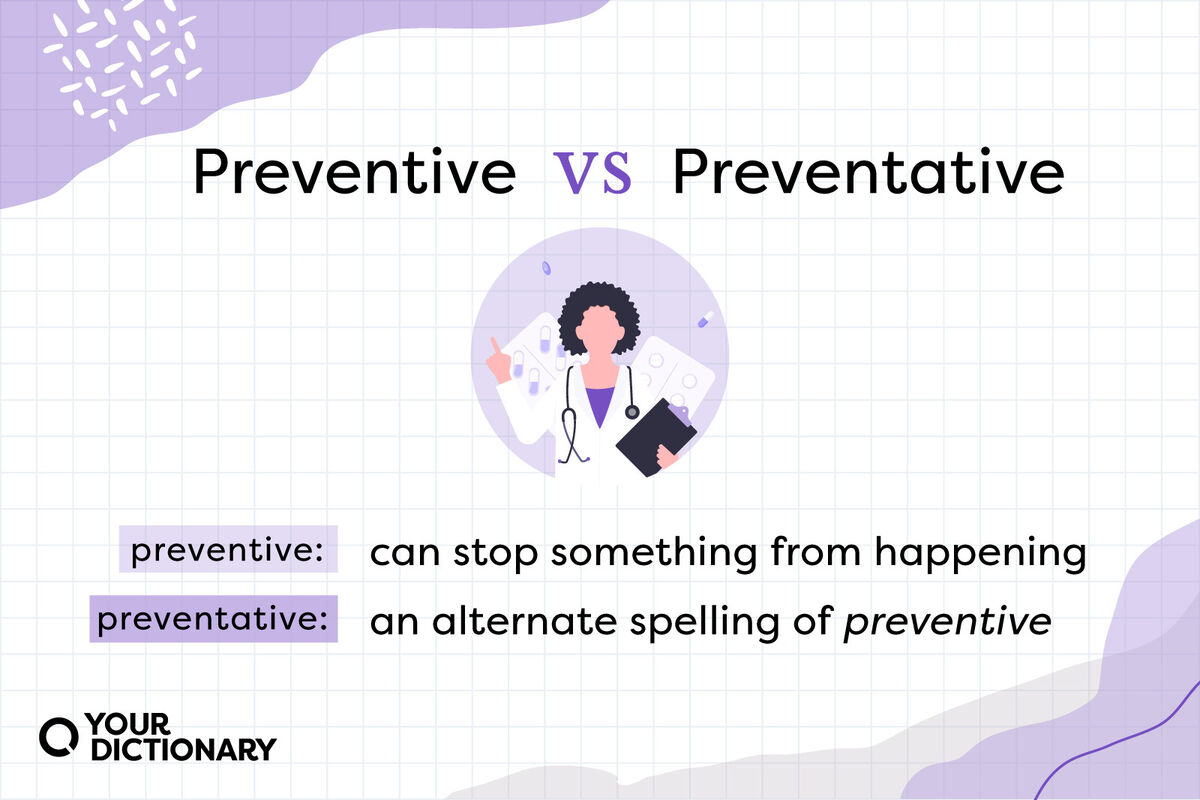
Preventative and preventive are both correct spellings. They mean “something that stops a bad thing from happening,” especially in the medical world, and they’re interchangeable. However, one is generally preferred in formal grammar — and it may not be the one you expect.
‘Preventive’ Is Technically Correct
Some writers prefer the word preventive over its synonym preventative because it’s a more grammatically correct formation. Preventive, which appeared in the early 17th century, combines the word prevent (“to stop”) with the suffix -ive (“quality of”) to describe something that has the ability to stop something else. It has a similar meaning to the word precautionary.
Preventive is also more popular than preventative. It appears in military phrases such as “preventive war,” which describes military action against a nation before it grows strong enough to disrupt the balance of power. If you’re writing a formal paper, using academic language or describing military processes, preventive is probably the preferable choice (and your computer’s spell checker probably agrees).
But ‘Preventative’ Is Also Fine
If preventive doesn’t sound right, you’re just fine using preventative. It appeared in English not much longer after preventive, and today, it’s interchangeable with preventive (except in the military context).
But that hasn’t always been the case. Preventative combines prevent with the suffix -ative (“relating to”), which some consider to be an irregular formation since prevent ends in a “t.” Yet there are several other English words with similar formations, such as vegetative and authoritative, so the modern difference between preventive and preventative isn’t as stark as it used to be.
How To Use ‘Preventive’ and ‘Preventative’
Both preventive and preventative refer to medications or treatments designed to keep someone from getting sick, or to actions taken to keep unwanted consequences from occurring. A person would use a preventive or preventative measure to avoid experiencing an unwanted outcome. You can use both words several ways in a sentence.
‘Preventive’ and ‘Preventative’ as Adjectives
When used as adjectives, preventive and preventative modify a noun:
- I'm looking for a healthcare provider who emphasizes preventive/preventative medicine.
- Diabetes runs in my family, so I follow a preventive/preventative low-sugar diet.
- A freeze is possible tonight, so I am going to cover my plants as a preventive/preventative measure.
‘Preventive’ and ‘Preventative’ as Nouns
You can also use preventive and preventative as a nouns, especially when describing medical treatments:
- I take a statin drug as a preventive/preventative since I have a family history of heart disease.
- Marcia considers the time she spends exercising now as a preventive/preventative to avoid loss of flexibility.
- We don’t want to get influenza, so we took the flu vaccine as a preventive/preventative.
‘Preventive’ and ‘Preventative’ as Adverbs
Finally, you can use preventive and preventative as adverbs (preventively and preventatively), but you should probably opt for preventively in this case. Most readers, dictionaries and spell checkers prefer preventively because preventatively can be difficult to pronounce. You should also consider simply using prevent in these cases to avoid wordiness.
- Take baby aspirin preventively to avoid cardiac problems.
- We installed locks on our windows to preventively avoid break-ins.
- We apply sunscreen preventively so we won’t have skin problems later in life.
What About ‘Preventable’ and ‘Preemptive’?
It’s tempting to use the similar-sounding preventable and preemptive instead, especially when you’re torn between preventive or preventative. But these words have different meanings, and using them in place of preventive or preventative is incorrect. They mean:
- preventable - able to prevent
- preemptive - doing something before someone else can do it
Using these words changes the meaning of a sentence. For example, if you say “A healthy diet is a preventive measure,” you’re saying that a healthy diet can prevent negative medical outcomes later. But if you say “A healthy diet is a preventable measure,” you’re saying that you can prevent having a healthy diet — a completely different message. And when you say “A healthy diet is a preemptive measure,” you’re saying that a healthy diet comes before something else, but aren’t clarifying what that is.